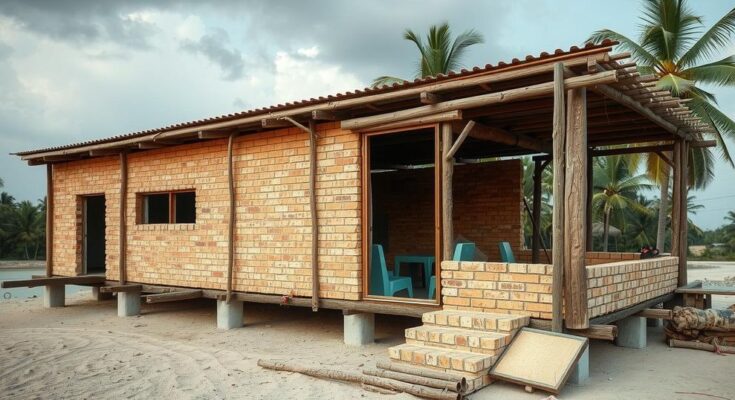Mozambique has begun constructing new shelters for those affected by Cyclone Chido, which left at least 70 dead and hundreds injured. Government efforts focus on resilient construction methods and community training to avoid future destruction. UNICEF reports thousands have been impacted, including significant educational and health infrastructure damage, amid concerns over worsening health crises due to existing outbreaks.
Mozambique has commenced the construction of houses for the victims of Cyclone Chido, which wreaked havoc across three northern regions of the country on Sunday. The cyclone has tragically resulted in the deaths of at least 70 individuals and injured around 600 others, leaving a path of destruction in its wake. Trade and Industry Minister Silvino Moreno, during his visit to the devastated areas, indicated that the government is actively engaged in providing necessary support to those affected, with assistance from international partners.
During his visit to the Nampula province, one of the most affected regions, Minister Moreno emphasized the critical importance of using resilient materials for the construction of new shelters. He articulated the intention to prevent the future destruction of homes built from subpar materials, which was a significant issue following the cyclone. Many houses in the impacted areas were made from mud and reeds, which were inadequate against the cyclone’s intensity. The minister remarked that there is a need for improved training in construction methods for the residents to enhance their resilience to future storms.
Prior to its impact on Mozambique, Cyclone Chido had already caused considerable devastation in Mayotte, a collection of French islands, resulting in loss of life and infrastructure damage. Furthermore, it inflicted destruction in southern Malawi, where strong winds and rainfall compromised homes and infrastructure. Mozambique’s meteorological agency is warning of additional storms anticipated over the next three months, urging communities to prepare adequately.
UNICEF reports that approximately 174,000 individuals have been affected by the cyclone, a figure that may rise as further evaluations are undertaken. Significant destruction has also occurred in educational and health sectors, with thousands of classrooms and 20 health facilities damaged. Michael Chimedza, UNICEF’s field office head in Zambezia province, conveyed that the organization has mobilized resources to respond to the immediate needs of 50,000 people and allocated funds for response training at the local level.
Aside from Nampula, the cyclone impacted Cabo Delgado and Niassa provinces, leaving over 25,000 families without electricity and damaging essential infrastructure such as health facilities, roads, and water supply systems. As the region grapples with an ongoing choleral outbreak, the recent catastrophic events increase the risk of exacerbating the health crisis, according to various aid agencies.
The article addresses the aftermath of Cyclone Chido in Mozambique, highlighting the government’s response to the destruction caused by the cyclone. On a broader scale, it discusses the challenges faced by the affected communities, with specific attention on the necessity of resilient housing and infrastructure. Additionally, it outlines the potential for worsening health crises in light of existing outbreaks and the ongoing impacts of the storm on local communities and essential services. The historical context of Cyclone Chido’s path through Mayotte and Malawi serves to underscore the broader regional implications of such natural disasters and the interlinked responsibilities of humanitarian agencies and local governments in recovery efforts.
In summary, Mozambique is taking urgent steps to construct resilient housing for the victims of Cyclone Chido following significant loss of life and widespread damage. Minister Silvino Moreno’s commitment to preventing future destruction through improved construction methods and community preparedness is evident. As international partners contribute to recovery efforts, the need for effective and swift responses to enhance community resilience remains paramount, particularly in light of ongoing health risks exacerbated by the cyclone’s catastrophe.
Original Source: www.voanews.com




